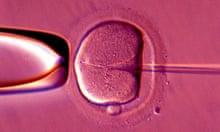IVF clinics have been putting profits before patient care by charging clients for expensive treatment add-ons that have no proven effectiveness, according to a draft statement by fertility experts, practitioners and the sector’s regulator.
The consensus statement agreed by 11 organisations, including the Human Fertilisation and Embryology Authority (HFEA), expresses concerns about how frequently patients are being charged for optional extras that do not increase the chances of pregnancy.
The statement, marked confidential (pdf) but published by the HFEA on its website, blames the “intensively competitive” private IVF market for a practice that it suggests threatens to undermine patient trust.
In July, the HEFA agreed to crackdown on the practice of charging top-up fees for experimental procedures.
The draft consensus statement goes further by stating that “there is currently no conclusive evidence that any of the add-ons offered in fertility treatment increase the chance of a pregnancy or live birth”.
It adds: “Patients deserve consistent, evidence-based treatment. Failing to provide this poses a significant risk to patient trust and to clinical innovation itself.”
Signatories to the statement include the Royal College of Obstetricians and Gynaecologists and the Senior Infertility Nurse Group.
It calls for a “culture change” among IVF clinics, urging them to have “an open and honest conversation about treatment add-ons”.
It also suggests that clinics are being too willing to agree to patient requests for expensive add-ons despite the lack of evidence for their efficacy. “Practitioners have a duty of care to patients, which should separate pressure from patients and commercial interests from their best practice advice,” it says.
The add-ons include genetic tests, time-lapse imaging of embryos, drug treatments that suppress a mother’s immune system and techniques such as assisted hatching that involve using acid, a laser or other tools to thin the protein coating from which an embryo must break out before it can implant in the womb.
Couples, who are often desperate to conceive a child, can become convinced of the effectiveness of such interventions, despite the lack of proven data, by reading about them online, the statement says.
It says: “This combination of patient expectation, market forces and a recasting of the professional-patient relationship in an online information age appears to be driving the supply of, and demand for, treatment add-ons.”
A survey of IVF patients conducted by YouGov for the HFEA and due to be published later this month suggests that many were unprepared for the expense of IVF treatment generally. It found that 62% of those treated at private clinics said they had paid more than they had expected to, compared with 23% of those who had visited an NHS clinic.
But 77% of those who opted for add-on treatments were satisfied with how open and transparent the costs of these were.
The Fertility Network, a charity for people who experience fertility problems and one of the signatories to the document, said it could not comment until the document had been finalised.
A risk report to the HEFA’s board warned that the regulator’s “bolder strategic stance on add-ons could result in claims that we are adversely affecting some clinics’ business model”.
The HFEA confirmed that the consensus statement had been published in error before it had been signed off.
Peter Thompson, its chief executive, said: “We are concerned that too many patients are being offered unproven treatment add-ons. While we do not want to put up unreasonable barriers to clinical innovation, we believe such add-ons should be available only where there is proof they work.
“That is why we’ve been working with professional groups to agree a statement about how treatment add-ons should be offered ethically in clinical practice in the UK. This statement is due to be published shortly.”
Prof Geeta Nargund, a senior consultant at St George’s hospital in London and the medical director of Create Fertility, said the HFEA should do more to end the practice of charging for add-ons.
“We need a national register that holds information about drugs and dosages administered to women during IVF treatment and early pregnancy, as well as any add-ons used in the lab,” she said.
“Some IVF add-ons such as the use of intravenous immunology drugs have no proven benefit, can be expensive and can pose health risks to women and babies.
“We therefore need a national register to monitor the safety and potential outcomes of the use of add-ons in both the short and long term.”









